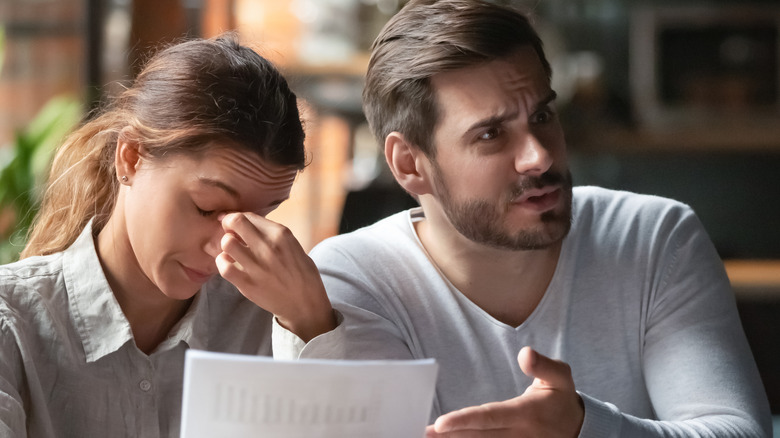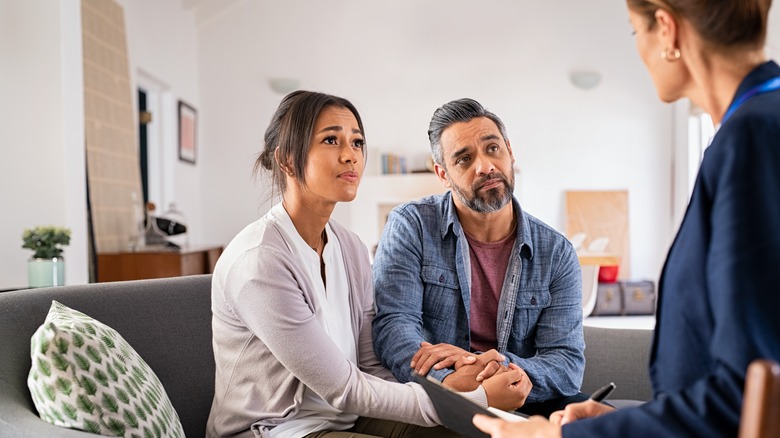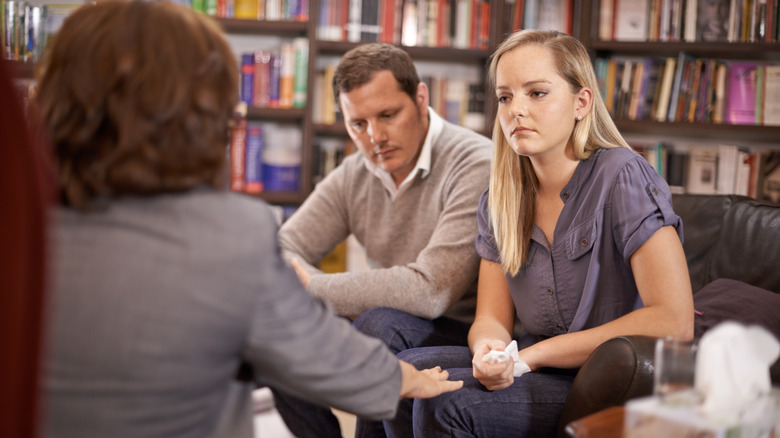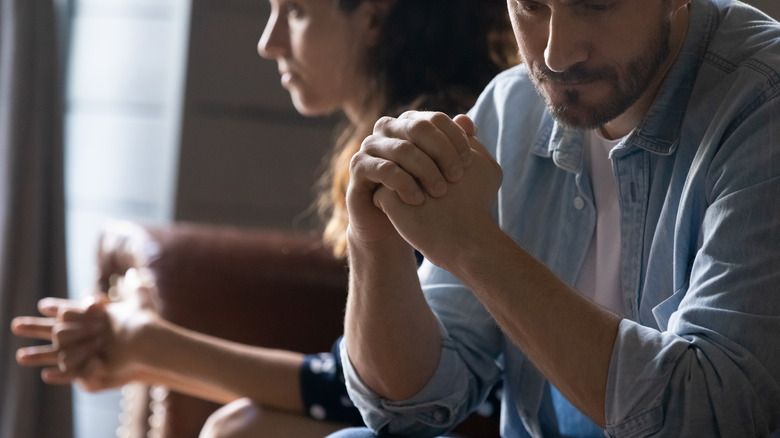The Biggest Mistakes You Can Make When Considering Couples Therapy
No relationship is perfect. Every romantic partnership goes through its ups and downs, and sometimes, professional help is needed to get past difficult recurring issues in the relationship in order to move forward and build a future. Whether you're married or simply in a long-term relationship, couples therapy can be a wonderful way to work on your relationship and keep it healthy. In fact, therapy can be a great tool even when the relationship is going well.
However, even if you and your partner have decided to try couples therapy, choosing a couples therapist isn't always as easy as it sounds. In fact, there are several common mistakes people make when considering getting couples therapy. We spoke to a few relationship experts and couples therapists to find out the most common pitfalls and how to avoid them so that you and your partner can get the most out of your couples therapy experience.
Expecting couples therapy to fix all of your problems
A common mistake that couples make when seeking out couples therapy is thinking that getting a therapist will "fix" all of their problems and heal their relationship. Unfortunately, there is no guaranteed "fix" when it comes to relationships. "As a psychologist with years of experience in couples therapy, I have seen firsthand the many mistakes that individuals and couples can make when considering this form of treatment," Niki Davis-Fainbloom, a sex and relationship expert at Practical Psychology tells us. "While couples therapy can certainly help to address and resolve conflicts within the relationship, it is important to have realistic expectations. Change takes time and effort, and it requires the commitment of both partners to make lasting improvements." In other words, therapy is unlikely to fix everything — instead, with work and time, it can create slow but steady change.
Stephanie Mintz, a relationship consultant at Strategic Relationship Consulting, agrees. "Just showing up to the sessions isn't going to fix everything," she says. "The rest of the week is needed to put the effort into what was discussed in the session." Mintz also adds that in order to really effect change, both individuals in the relationship may also benefit from individual therapy, too.
While therapy isn't a guaranteed fix-all, it can certainly help — especially when you and your partner put the work in.
Assuming that every couples therapist is the same
Another very common mistake that people make when looking for a couples therapist is to assume that most relationship therapists are basically the same. Often, couples end up choosing the first couples therapist they find or the closest therapist to their home. What they may not realize is that each couples therapist has his or her own strengths and weaknesses. And the individual therapist you choose matters. "People don't go to couples therapy as much as they experience a couples therapist," Dr. Tom Murray is a sex and relationship expert in Greensboro, North Carolina, where he owns and operates A Path to Wellness tells us. "Couples therapy is delivered differently based on the philosophy of the therapist. If the couple doesn't feel like it's a fit within the first session, they should shop around." So, if your couples therapist doesn't feel quite right, don't be afraid to try someone else.
According to Davis-Fainbloom, assuming that every couples therapist is the same "could not be further from the truth." She adds, "Just like in any other profession, there are therapists with different approaches, styles, and levels of experience. It is important to do your research and find a therapist who is a good fit for you and your partner."
Expecting only 1 or 2 sessions to do the trick
If you're considering trying couples therapy, you should expect to be in it for the long haul. Many couples hope that one or two sessions with a therapist will make a dramatic difference in their relationship — however, therapy rarely works so quickly. In fact, it might even be months before you notice any changes at all.
So, how long will it take? Well, that depends on your issues and your approach to the therapy itself. "If you think about it, it took a while to get to where you are with having difficulties," explains Mintz. "This means it will take time to work through those difficulties. The length of time will also be determined by how much effort you put into the therapy both in the sessions and the rest of the time." While every couple's journey will be different, it's likely that one or two sessions with a therapist won't be enough to make any real, lasting change in your relationship.
Hoping that the therapist will help prove your side
One reason that couples often consider getting therapy is to prove a point to their partner — that they are in the wrong. "Nearly every couple I have ever seen comes into my office with the same agenda: Help me to change my partner so that I can be happier," says Murray. "They also start the session with the same story, 'This is what they did to me.'" According to Murray, if a couple comes into therapy with this attitude, they should try to steer the conversation away from blame. "A good couples therapist is someone who avoids the temptation to divide the couple into who is the saint and who is the sinner," Murray says. "My view is that each partner is trying to do the best they can in their most imperfect ways."
Mintz agrees that therapy shouldn't be about determining who is right and who is wrong. "Their job is to help you understand what happened, why, and then how to work through it. Playing the blame game isn't going to help you."
It's natural to feel that you are right in most situations, but if you plan on trying couples therapy, it's important to keep an open mind from the beginning — and try not to blame your partner too much!
Not considering insurance and expense
Another major mistake that many couples make when considering getting couples therapy is to forget about the expense of therapy until it is too late. Many couples assume that therapy is covered by insurance — but it isn't always so simple. "Insurance requires that the therapist diagnose one of the partners as having a mental illness and that the relationship distress is a product of the mental illness," warns Murray. "Most marriage and family therapists see problems as occurring between people, not between one person's ears." In other words, couples therapy often isn't covered by insurance. Murray also explains that insurance companies typically pay less for family therapy than they pay for individual psychotherapy. "A low reimbursement rate is a major barrier that consumers might be unaware of," he says.
Davis-Fainbloom suggests that couples look into the expenses involved in couples therapy before committing to any sessions. "It is important to be aware of what your insurance covers and to find a therapist who is within your budget," she says. "However, skimping on therapy because of cost may not be the best decision in the long run. Investing in your relationship is ultimately worth the investment."
Hoping that a general counselor will be able to provide couples therapy
If you are experiencing problems in your relationship, it might be tempting to speak to your individual therapist about your relationship. In fact, you might even hope that you can skip the couples therapy and use a general therapist for your couples therapy needs. Unfortunately, seeing a general therapist as a couple rarely works.
"Many individual therapists who are new to the work of couples therapists or who have little to no training in couples therapy tend to work with couples the same way that they work with individuals," says Murray. "This is a huge problem. Couples come into the therapy room because they're in a crisis. Consequently, they do not want nor do they benefit from a nodding-head therapist who has 'how do you feel about that' on repeat. They yearn for direction and clear feedback. More, they want an advocate for their relationship."
Davis-Fainbloom agrees that looking for a specialist is always the best route. Simply put, someone trained specifically in couples therapy will always give the best service. "This will ensure that you are getting the most effective treatment for your specific needs," she says.
Having an outcome in mind before you begin
It's natural to imagine what life after couples therapy might be like. Many couples even come to their first session with an outcome fully formed in their minds. However, this can be dangerous and unhelpful as expectations can make the process even harder. "Having an outcome in mind before you begin couples therapy can be a mistake," says Davis-Fainbloom. "It is important to be open to the process and to be willing to make changes, even if they are not what you initially had in mind. Rigidly holding onto a specific outcome can prevent you from fully embracing the therapeutic process and making the most of it."
Mintz also adds that having an outcome in mind might mean you aren't accepting what's best for you and your partner. "Couples therapy is about the relationship and what is best for the relationship," she says. "Sometimes that is strengthening the relationship, but sometimes it is about the couple realizing it is time to end the relationship."
Not being open to letting yourself change
Therapy is all about opening yourself up to change. However, when you are considering couples therapy, you may be hoping that your partner is the one who changes. However, if you open yourself up to change, the process might not yield the results you're after.
"It is important to approach couples therapy with an open mind and a willingness to take an honest look at yourself and your role in the relationship," Davis-Fainbloom tells us. "This may require acknowledging areas where you need to make changes, whether it be in the way you communicate, your behaviors, or your thought patterns. It is only by being open to making changes in yourself that you can make lasting improvements in your relationship. Remember that change is a process, and it takes time, requiring patience, effort, and a commitment to the therapeutic process."
Before you consider couples therapy, try to open up your mind to change so that you can get the most out of the experience.
Not looking for the right things when seeking a counselor
Many couples who look for a couples therapist don't know where to begin the search. Some of the most common mistakes occur when the couple fails to look for the right things in their therapist.
As Murray explains, couples therapists tend to get better and better over the years. Apparently, this is unusual in the world of therapy. "In traditional individual therapy, the effectiveness of the therapist is not correlated with years of experience, level of education, professional training, nor does effectiveness improve with additional continuing education," he says. "In short, most individual psychotherapists, they're as good or bad as they were when they began. That's the ugly truth about our profession."
However, it's different with couples therapy. "The science suggests that the effectiveness of a couples therapist increases with more experience working with couples," he says. In other words, don't make the mistake of looking for someone with impressive qualifications. While these may help, one of the most important things to look for is often experience.
Not discussing getting a couples therapist with your partner
If you're considering getting a couples therapist but haven't discussed the idea with your partner, you're probably not off to a great start. In fact, this may actually do more harm than good.
"It is important to have open and honest communication with your partner about the decision to seek therapy," warns Davis-Fainbloom. "This includes discussing any concerns or reservations you may have, as well as setting goals and expectations for the therapy process. By openly communicating with your partner about couples therapy, you can ensure that both of you are fully committed and invested in the process. It is only by working together and being on the same page that you can make meaningful progress in your relationship."
Before you schedule your first therapy session, try to have an open, calm discussion with your partner about what you both want to get from the session, what you both expect, and, most importantly, if you both really believe in giving the process a try.
Expecting couples therapy to be a permanent fix
When considering couples therapy, you may be imagining that after a course of sessions, you and your partner will be "fixed" — and that you'll live happily ever after. Unfortunately, therapy is more of an ongoing process — and even if you make steps toward improving your relationship, the work will continue long after your last therapy session. In many cases, couples find that they need more therapy in the future.
"While couples therapy can certainly lead to long-lasting positive changes in a relationship, it is important to remember that it is a continuous process of growth and maintenance," says Davis-Fainbloom. "It takes effort and commitment from both partners to maintain the progress made in therapy and to continue working on communication and conflict resolution. While couples therapy can be an incredibly powerful tool for improving a relationship, it is not a permanent fix."
Mintz even describes therapy as a "good start" rather than a solution. "The work you do in the sessions and then throughout the week is going to be ongoing," she says. "Relationships always take effort, but it can be enjoyable effort."
Hoping that things get better on their own
If you're considering couples therapy, it's pretty common to spend a few months or even years deliberating about whether it's the right choice for you and your partner. Many people find themselves putting couples therapy off, hoping that the relationship issues will sort themselves out — something that doesn't often happen. However, once you decide that there's a problem in the relationship that isn't being resolved, it's usually better to try couples therapy sooner rather than later.
"If things don't change, things won't change," says Mintz. "This means, that hoping things will get better on their own, will only allow the difficulties to become deeper and more difficult to work on. It is best to get help right away. It is really helpful to go to therapy when there aren't big problems to work on strengthening the good relationship." The sooner you try couples therapy, the better!
You enter into couples therapy when your heart isn't in it
One final mistake that many couples make when considering couples therapy is to agree to therapy sessions when one or both parties aren't really in it. While it may be tempting to agree to a therapy session to appease your partner, until you really want therapy, you should probably hold off. "Couples therapy is only for couples who are leaning into the relationship," Murray says. "A couples therapist is hired to be an advocate for the relationship. That's my job. Consequently, my expectation is that each partner will examine their respective contributions to their relationship's distress and endeavor to address problematic behaviors."
Davis-Fainbloom agrees that only couples who are going to give therapy a fair go should try it. "It is important to be fully committed and invested in the therapy process in order to make meaningful progress," she says. "If you are not fully committed to the process, it is likely that you will not be fully present and engaged in the therapy sessions, which can make it more difficult to address and resolve conflicts within the relationship."
Be honest with yourself about whether you're willing to embrace therapy, or whether you're going to the sessions begrudgingly. "If you are not fully committed," she says, "it may be beneficial to take some time to consider your motivations and whether couples therapy is the right decision for you at this time."













